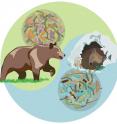Bears' seasonal hibernation linked to changes in gut microbes
Each year, as bears prepare to hibernate, they gorge themselves on food to pack on fat. And yet, despite the rapid weight gain, the animals somehow avoid the health consequences so often associated with obesity in humans. Now, researchers reporting in Cell Reports on February 4 show that the bears' shifting metabolic status is associated with significant changes in their gut microbes. Fredrik Bäckhed of the University of Gothenburg in Sweden, who led the new study, said he was particularly struck by the discovery that the bears' summer gut microbiota includes microbes that take in more energy from the diet.
"The restructuring of the microbiota into a more avid energy harvester during summer, which potentially contributes to the increased adiposity gain without impairing glucose metabolism, is quite striking," he said.
Bäckhed and his colleagues showed more than 10 years ago that the composition of the gut microbiota can influence the amount of energy harvested from the diet. Much more recently, they found that the microbiota also shifts in people who are obese and in those with type 2 diabetes. That led them to wonder whether changes to the microbiota might also be important in hibernating brown bears in the wild.
The researchers collected fecal samples from wild bears during hibernation and in the active period and analyzed the microbes living within those samples. The hibernation microbiota showed reduced diversity, they report. The identity of the microbes in the guts shifted from more Firmicutes and Actinobacteria to more Bacteroidetes. The researchers also observed changes in several metabolites involved in lipid metabolism, including triglycerides, cholesterol, and bile acids, over the course of the season.
To further explore whether those changes in the microbiota might drive the shift in metabolism, the researchers transferred the bears' summer and winter microbiota into germ-free mice in the lab. Mice colonized with a summer bear microbiota showed greater weight and fat gain than mice colonized with a winter bear microbiota, they report. What's more, despite their increased weight, mice colonized with summer bear microbiota showed no differences or even a slight improvement in their glucose metabolism compared to mice colonized with a winter microbiota.
Further investigation of the metabolites circulating within those mice also showed some similarities to the bears, suggesting that the bears' seasonal metabolic status had been partially transferred to the rodents via those microbes. Bäckhed said the findings lead him to think "that the microbiota may be a more important switch for energy metabolism and cold adaptation than previously appreciated."
Interestingly, Bäckhed noted, another recent report in Cell suggests a link between the microbiome and exposure to cold temperatures. Bäckhed's team is now exploring this link through additional studies.
They also say it's possible that the findings in bears might suggest new strategies for managing obesity in humans.
"I think it's too early [to say], as I consider this being very basic science," Bäckhed said. "However, if we learn more about which bacteria and the functions that promote and/or protect against obesity [in hibernating bears], we may identify new potential therapeutic targets."
Source: Cell Press
Other sources
- Gut microbes 'help bears hibernate'from BBC News: Science & NatureFri, 5 Feb 2016, 8:31:36 UTC
- Bears' seasonal hibernation linked to changes in gut microbesfrom Science DailyFri, 5 Feb 2016, 1:21:54 UTC
- Bears' seasonal hibernation linked to changes in gut microbesfrom PhysorgThu, 4 Feb 2016, 17:02:52 UTC

